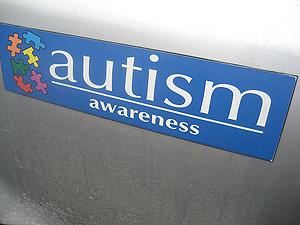Autism facts and fiction
(Image by Flickr user Eugene Peretz (CC: by-nc-sa))
This story is adapted from a broadcast audio segment; use audio player to listen to story in its entirety.
New studies are often released — and retracted — on what causes autism spectrum disorder and what cures it. For example, the British medical journal, “The Lancet” recently retracted the frequently cited Wakefield study from 1998 which linked MMR (measles, mumps and rubella) vaccines to autism.
Just a few days later, the journal “Autism Research” published a study that said advanced maternal and paternal age is a risk factor for autism.
So what does the latest data really say about autism causes and cures?
Dr. Perri Klass and Dr. Eileen Costello are pediatricians and co-authors of “Quirky Kids: Understanding and Helping Your Child Who Doesn’t Fit In — When to Worry and When Not to Worry.” They’ve spent a good deal of time looking into what distinguishes autism facts from autism fiction.
Autism is complicated because it encompasses an entire “spectrum” of behaviors and levels of function, according to Dr. Klass. “That’s kind of new. That wasn’t around when I was in medical school, let alone when I was a child,” she said.
The behaviors can include difficulty with social cues and communication, repetitive acts and obsessional interests, among other things.
In terms of the supposed causes of autism, vaccines are no longer on the list. This is something Dr. Costello is happy to see.
“I think the Wakefield study … really caused a lot of fear and panic around the world, and caused a lot of parents to have anxiety about immunizing their children,” she said. “And it’s a real blessing that the paper was retracted.”
What can cause autism are viruses, like influenza and herpes, that can affect pregnant women; as well as parental age. “There is growing data that advanced parental age is a factor,” said Costello.
For autistic children, says Klass, behavior therapies can be more effective than looking for a cure in special diets and/or vitamin dosing.
Costello confirmed this on a blog post for “The Takeaway”: “Although the autistic disorders are generally considered lifelong conditions, many children with mild symptoms to begin with will make significant progress with intensive behavioral therapies, the only approach to date with evidence to support it.”
“That urge to get children looked at and diagnosed earlier rather than later, and get them help early, is where a lot of our attention and efforts should be going,” said Klass.
Read more of Costello’s thoughts in “The Top Five Autism Myths.”
“The Takeaway” is a national morning news program, delivering the news and analysis you need to catch up, start your day, and prepare for what’s ahead. The show is a co-production of WNYC and PRI, in editorial collaboration with the BBC, The New York Times Radio, and WGBH.
